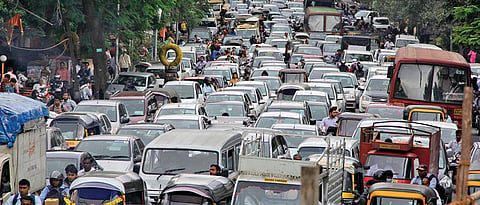

No one wants to be on Karve Road or at Paud Phata in the evening, or even Hinjewadi for that matter. Traffic moves at snail’s pace and everyone just wants to get home after a long day at work. Pune, renowned as a city for education and retirement, now has a burgeoning population that blocks its roads and pollutes its rivers. With the population projected to increase further, Pune is going to become more susceptible to stresses on its infrastructure and resources.
India country manager for UN Habitat Hitesh Vaidya believes cities need resilience plans so as to provide local governments with tools for integrated policies and processes, including institutionalisation within the local governance structure to address and contribute towards building and strengthening cities, to meet the challenges of urbanisation. “From the UN-Habitat perspective, integration of different dimensions and scales of the city and between all sectors directly involved in sustainable urban development is key to build resilience,” Vaidya said.
Luckily for Pune, it is one of Rockefeller Foundation’s 100 Resilient Cities (100RC) for the next three years. An MoU was signed between 100RC and the Pune Municipal Corporation in September 2017. The other Indian cities that are part of the 100RC programme are Jaipur, Chennai and Surat.
100RC defines urban resilience as “the capacity of individuals, communities, institutions, businesses and systems within a city to survive, adapt, and grow no matter what kind of chronic stresses and acute shocks they experience”. “Sometimes cities work on resilience plans, which they may prepare for a particular sector or area but not for the whole city. But there is no guiding document for successors as these plans may be driven by individuals or parties,” said Mahesh Harhare, the Chief Resilience Officer appointed by 100RC.
“100RC will identify shocks and stresses that Pune faces and create an umbrella strategy for resilience. In addition to this, we will also ensure that the resilience office is institutionalised,” informed Harhare, who is assisted in his work by consultants from Dalhberg, two PMC engineers and some interns.
Pune’s 100RC unit has identified four of five priority areas to develop the resilience strategy: mobility, urban environment, solid waste management, and urban growth and informal settlements. The fifth area will be one among economy, livelihood and employment. These areas have been chosen after an agenda setting workshop with key individuals in the city and PMC representatives, and also based on previous reports. Online and offline surveys were conducted among 700 citizens to assess their perception of these priority areas.
“Experts have also been interviewed to decide priority areas. And now, working group meetings are being held to discuss these areas. We have had two so far, one on mobility and one on urban environment,” Harhare said. Experts include Dr Anant Chiplunkar (ex-director of the Asian Development Bank), Vidyadhar Deshpande (ex-town planning director of Maharashtra), Sanskruti Menon (Centre for Environment Education), and NGOs like Jeevitnadi, among others. 100RC has 104 international platform partners, who will also help with the strategy and projects.
Dharmaraj Patil, a biodiversity expert and director of NGO Jeevitnadi, was present at the working group meeting on urban environment. “We expect that 100RC will carry out ecological interventions in ongoing PMC projects and launch new projects to conserve the city’s environment, if required. Further, they should plan habitat and do corridor mapping in Pune city limits on priority basis, with the help of experts and NGOs,” he shared. He also hopes that 100RC can help the PMC “retrospect” on past projects, like the Pashan lake beautification project, which not only wasted money but destroyed ecosystems, so that such mistakes can be avoided in new projects.
In the three years of 100RC’s involvement in Pune, the first year is for preparing a resilience strategy and the remaining two years are for executing pilot projects. The involvement will end in November 2020. But since “Pune is one of the important cities for Rockefeller Foundation, the involvement is likely to be continued,” shared Harhare.
Pune Municipal Corporation’s environment officer Mangesh Dighe is hopeful about 100RC’s work in the city. “Pune does have a disaster management plan, but such a project (100RC) is essential with respect to sustainable development. We needed an individual who can work specifically on resilience,” he said. “PMC does manage mobility, sewage and other aspects that define a resilient city, but we need to have international knowledge for a way forward on resilience. 100RC is a good platform for this, and to connect with other cities,” he added.
Though resilience is a new concept for the various institutions 100RC’s CRO is working with, they are willing to come on board. Harhare confided, “Explaining resilience to them is a critical task. And importantly, we have to ensure they understand that the resilience strategy will be a live document which will be institutionalised.”
